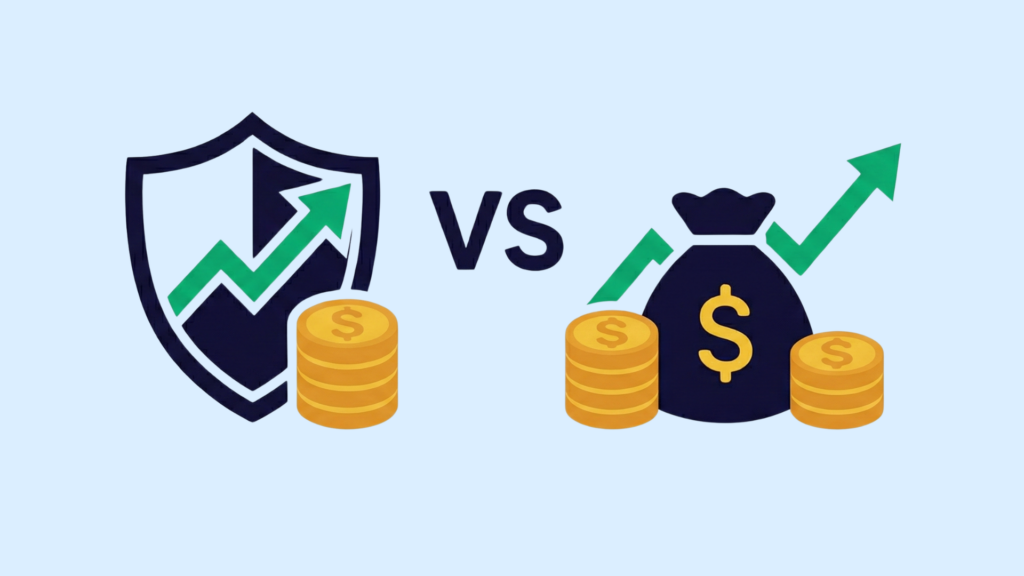Fixed-income mutual funds are a reliable investment option designed to provide stable returns through a diversified portfolio of debt securities. These funds focus on generating regular income while preserving your capital, making them a valuable choice for investors seeking lower-risk opportunities.
Moreover, their predictable returns and lower volatility help smooth out market fluctuations, ensuring your portfolio remains resilient and aligned with your long-term financial goals.
This article discusses the benefits of fixed-income mutual funds and how you can invest in them. Read along!
What Are Fixed Income Mutual Funds?
Fixed-income mutual funds—debt or bond funds—are designed to invest primarily in assets such as government securities, corporate bonds, and other money market instruments.
The main goal of these funds is to generate a steady income for you through regular interest payments from the underlying securities held in the portfolio.
By pooling investments into these fixed-income assets, these funds offer you a more predictable return than equity funds, making them a safer option for conservative investors.
Features of Fixed Income Mutual Funds
Fixed-income mutual funds are designed to generate consistent income while preserving your capital, making them a popular choice for conservative investors. So, let’s look into the key features that make fixed-income mutual funds a solid addition to your portfolio:
Diverse Asset Allocation
Fixed-income mutual funds invest in various debt securities, including government and corporate bonds, treasury bills, and money market instruments. This diverse allocation helps spread risk across different types of assets, offering you a balanced approach to investing in the bond market.
Regular Income
One of the main attractions of fixed-income mutual funds is their ability to provide regular interest income. By investing in these funds, you can expect a steady income stream, making them ideal if you’re looking for consistent cash flow.
Risk and Return Profile
Fixed-income mutual funds are less risky than equity funds and offer more stable and predictable returns. This makes them a safer choice if you prefer to minimise volatility while still earning a reasonable return on your investment.
Benefits of Investing in Fixed Income Mutual Funds
Here are some key advantages of including fixed-income mutual funds in your portfolio:
Capital Preservation
Fixed-income mutual funds are focused on preserving your capital while providing modest returns. They invest in high-quality debt securities, ensuring that your initial investment is largely protected from significant market downturns.
Diversification
Including fixed-income mutual funds in your portfolio can help you achieve diversification and reduce overall risk. By spreading your investment in different types of investments, these funds add a layer of stability to your portfolio, complementing more volatile assets like stocks.
Inflation Protection
Certain fixed-income funds offer protection against inflation through interest rate adjustments. These funds are designed to help investors keep pace with rising prices, ensuring their purchasing power is maintained over time.
Professional Management
Fixed-income mutual funds benefit from the expertise of expert fund managers who carefully select and manage a diversified portfolio of debt securities. Their experience and knowledge can help you achieve your financial goals with a well-balanced and expertly managed investment.
How to Invest in Fixed Income Mutual Funds
Now that you know about the multiple benefits that fixed-income mutual funds offer, here’s how you can go about investing in them:
- Assess Your Financial Goals
Before investing, align your fixed-income investments with your financial objectives. Consider your investment horizon and income needs, ensuring that these funds match your short-term or long-term goals and provide stability.
- Choose the Right Fund
Coming to how you can choose the right fixed-income mutual fund:
Fund Type Selection
There are various types of fixed-income funds, such as government bond funds, corporate bond funds, and money market funds. Each type suits different risk appetites and financial goals, so select a fund that matches your comfort level with risk and aligns with your objectives.
Fund Performance
Reviewing a fund’s past performance, credit quality, and the fund manager’s experience is crucial. While past performance doesn’t guarantee future results, it provides valuable insights into how the fund might perform under similar market conditions.
- Understand the Expense Ratio
The expense ratio, the annual amount charged by the fund, is expressed as a percentage of your investment. This fee can affect your returns over time, so it’s wise to compare expense ratios across different funds to make cost-effective choices that maximise your net returns.
- Invest Through a Trusted Platform
You can invest in fixed-income mutual funds through direct plans or regular plans. Choose a reliable and user-friendly investment platform that meets your needs and offers the support you require for a smooth investing experience.
- Monitor and Review Your Investments
Regularly monitoring your fund’s performance is essential to ensuring it continues to meet your financial goals. So, adjust your portfolio as needed based on changing financial goals and market conditions to keep your investments on track.
Factors to Consider Before Investing
Before investing in fixed-income mutual funds, knowing the factors that can impact your investment’s performance is important. Some of these factors include:
Interest Rate Risk
Interest rate changes can significantly affect the value of fixed-income investments. When interest rates hike, the value of existing bonds typically falls, decreasing the overall value of your fund.
Credit Risk
Assessing the credit quality of the securities in the fund’s portfolio is essential to managing risk. Higher credit quality generally means lower risk, but it’s important to review the credit ratings of the bonds in the fund to ensure you’re comfortable with the level of risk involved.
Inflation Risk
Inflation can depreciate the purchasing power of your returns over time. Fixed-income investments are particularly vulnerable to this, as the interest payments you receive may not keep pace with rising prices, potentially reducing the real value of your income.
The Bottom Line
Fixed-income mutual funds offer a solid blend of capital preservation, regular income, and lower risk, making them an important part of a balanced investment strategy. With diverse asset allocation, these funds provide stability and predictable returns, especially for conservative investors.
If you’re considering adding fixed-income mutual funds to your investment mix, a platform like the Appreciate trading app makes it easy and accessible. With features like ₹1 minimum investment, automated SIPs, and one-click investing, Appreciate allows you to incorporate these funds seamlessly into your long-term strategy.
Fixed-Income Mutual Funds FAQs
What are fixed-income mutual funds?
Fixed-income mutual funds are investment vehicles that pool money from several investors to purchase a diversified portfolio of bonds or other debt securities. They aim to provide regular income to investors through interest payments and returns from these securities.
How do fixed-income mutual funds work?
Fixed-income mutual funds invest in various debt instruments, such as government bonds, corporate bonds, and treasury bills. The income generated from interest payments and capital gains is distributed to investors, while fund managers actively manage the portfolio to achieve the fund’s objectives.
What are the benefits of investing in fixed-income mutual funds?
Investing in fixed-income mutual funds can provide a steady income stream and reduce risk through diversification. They are generally considered lower-risk than equity funds, making them a comparatively safer option for conservative investors.
What risks are associated with fixed-income mutual funds?
Fixed-income mutual funds are subject to interest rate, credit, and inflation risks. Also, changes in interest rates can affect the value of the bonds held in the fund, and there is always a risk that issuers might default on their debt.
How can I choose the right fixed-income mutual fund?
To choose the right fixed-income mutual fund, consider your investment goals, risk tolerance, and the fund’s historical performance. You should also consider the fund’s expense ratio, the credit quality of the holdings, and the fund manager’s expertise.
What is the difference between fixed-income mutual funds and equity funds?
Fixed-income mutual funds invest primarily in bonds and debt securities, focusing on generating regular income with lower risk. Equity funds, on the other hand, invest in stocks and aim for capital growth but come with higher risk.
How do interest rate changes affect fixed-income mutual funds?
When interest rates rise, the value of existing bonds in a fixed-income mutual fund typically falls, decreasing the fund’s net asset value. Conversely, bond prices usually increase when interest rates decline, boosting the fund’s value.
Are fixed-income mutual funds suitable for beginners?
Fixed-income mutual funds can be suitable for beginners due to their lower risk than equity funds and the potential for steady income. They offer an accessible way to invest in bonds without extensive market knowledge.
What types of securities do fixed-income mutual funds invest in?
Fixed-income mutual funds invest in various debt securities, including government bonds, corporate bonds, municipal bonds, and treasury bills. The specific mix of securities depends on the fund’s investment strategy and objectives.
How can I start investing in fixed-income mutual funds?
To start investing in fixed-income mutual funds, open an account with a brokerage house or company and select a fund that aligns with your investment goals.
Read more Mutual Fund Related Articles by Appreciate:
Direct vs Regular Mutual Funds
If you are interested in investing in mutual funds, here are some more investment opportunities for stocks and shares that might interest you.
How to Buy Apple Shares in India
How to Buy Amazon Shares from India
How to Buy Google Shares from India
How to Buy Microsoft Shares from India
How to Buy Tesla Shares in India
How to Buy McDonald’s Shares in India
How to Find Multibagger Stocks
Best Semiconductor Stocks in India























